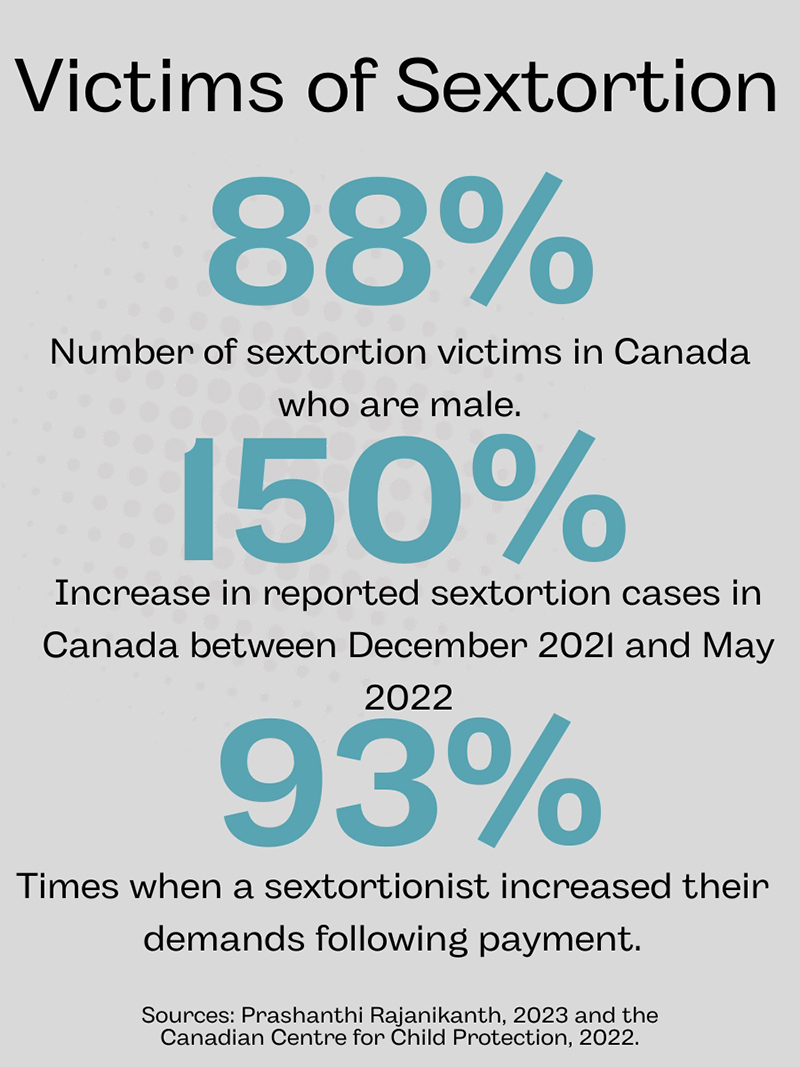Sextortion is the act of extortion using sexual material, like a photograph. Graphic by Justin Sibbet.
A single lapse in judgement can lead anyone down a dark path involving blackmail, the destruction of relationships and ultimately suicide.
While it may appear to be a mostly innocent message meant for a potential sexual partner, a nude photo sent across the internet can be used in horrific ways.
Sextortion, the act of blackmail with lewd photographs, is on a sharp and historic rise in Canada, according to Statistics Canada. In fact, according to the Canadian Centre for Child Protection, in the short time between December 2021 and May 2022, Canada saw a 150 per cent increase in reported cases of the crime.
While most victims are men between the ages of 20 and 39, approximately 40 per cent of all victims are under 18-years-old, according to a report by Mount Royal University, The Cyber Pandemic: Exploring the Financial Sextortion of Young Males, written by Prashanthi Rajanikanth on April 21, 2023. This now turns the crime into a more severe form of child abuse and child pornography.
Baylee Schmidt, a child and family advocate at the Chinook Sexual Assault Centre, says many under-aged victims meet future attackers through online games or group chat platforms.
“A lot on Discord and a lot on Snapchat. We see some on Instagram and even Roblox or Minecraft,” said Schmidt.
This attack on children in Canada has led to an increase in education for children to ensure they understand the best practices when going online.
“It’s important, especially with our youth, to teach them internet safety and encourage them to not send photos,” said Schmidt. “Also teaching them that if you have shared a photo and somebody [is using it against you], please talk to someone, please access support.”
The adage of ‘once on the internet, always on the internet’ rings horribly true in these cases.
Schmidt says an image can be shared easily and without the consent or knowledge of the victim.
“When things are shared, especially over the internet, they quickly fall out of our control,” said Schmidt. “We are no longer in charge of who has access to it, who can see it.”
She says older boys, 13 and up, are the more common victims when youth are targeted, potentially due to their increased access to cell phones and other online platforms. However, as 60 per cent of victims are over the age of 18, education and support for adults is paramount when combatting this cyber pandemic.
Jason Lawrence, a conduct officer at Lethbridge College, says students in Lethbridge are increasingly interested in learning more about this crime and how to prevent it.
In an email sent to Lethbridge Campus Media, Lawrence says participants responded well above regional averages in a recent survey.
“Sextortion is a narrow slice of the larger issue of gender-based sexual violence. Students are very interested in the larger topic of sexual violence and sexual harassment as can be seen in their participation in last year’s AB Post-Secondary Student Gender-Based Violence survey. Lethbridge College students’ response rates were more than double the provincial average.”
He says the Wellness Services area at Lethbridge College has a gender-based sexual violence student support advisor who can assist students with any questions or concerns they may have.
Alternatively, Lawrence says an online platform has been launched to give students a safe and comfortable way to report crimes of sextortion, or other sexual assaults.
“They can record their experience in our gender-based violence platform – REES. [This platform] ensures that it is recorded in their voice and only once so that they do not have to re-live the trauma of their experience,” said Lawrence.
It is immensely important for victims to reach out when they are targeted as these crimes often come with serious and destructive effects. According to Cybertip.ca, Alberta saw 100 reports of sextortion against young males between March and December 2022 alone. The Mount Royal report also states 88 per cent of sextortion victims in Canada are males.
The overall spike in cases has coincided with a reported 75 per cent increase in online activity by Canadians aged 15 and up since the onset of the COVID-19 pandemic. Furthermore, victims are urged to not pay ransom money and to instead get help through various support services or go directly to the police.
Students at Lethbridge College can visit Wellness Services or report abuse with REES on https://www.reescommunity.com/campus/.
Alternatively, students and people in the community at large, can reach out to the Chinook Sexual Assault Centre at https://www.csacleth.ca.

